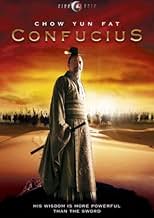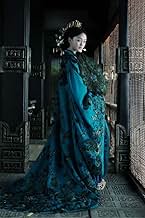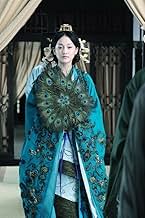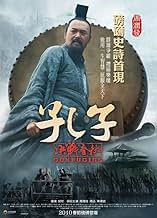NOTE IMDb
6,1/10
4,1 k
MA NOTE
Ajouter une intrigue dans votre langueThe life story of the highly-influential Chinese philosopher, Confucius.The life story of the highly-influential Chinese philosopher, Confucius.The life story of the highly-influential Chinese philosopher, Confucius.
- Réalisation
- Scénario
- Casting principal
- Récompenses
- 6 victoires et 14 nominations au total
Lu Yao
- The Ruler of Lu
- (as Yao Lu)
Dongyan Ma
- Ran Qiu
- (as Ma Qiang)
Avis à la une
the extremely bad thing about this movie is Chinese government try to control movie market and push it eagerly. in order to do it, Chinese government forced hot movie Avator out from cinema. as a result, there is no doubt, Chinese internet users initiate a movement to boycott this movie. they say: we don't have votes. however, we have cinema tickets. so, box office of this movie is horrible now. that is also why so many people give it a very low vote, such as 1 out of 10. i consider this movie as an victim. without Chinese government's "support", the box office will be much better.
the stories of Confucious are horrible, full of fake stuff. Confucius is THE most famous ideologist and educator in Chinese history. you can not see it in this movie. he is not a politician or militarist. However, it is very sad to see Confucius in this movie he is a politician and militarist, rather than an ideologist and educator. this will mislead so many people to recognize him, especially young people and non-Chinese.
the CG is horrible, too. you can see scenes of the movie are copied from other movies.
i am a Chinese. it is sad to see Confucius is deformed like this in order to cater somebody's taste.
the stories of Confucious are horrible, full of fake stuff. Confucius is THE most famous ideologist and educator in Chinese history. you can not see it in this movie. he is not a politician or militarist. However, it is very sad to see Confucius in this movie he is a politician and militarist, rather than an ideologist and educator. this will mislead so many people to recognize him, especially young people and non-Chinese.
the CG is horrible, too. you can see scenes of the movie are copied from other movies.
i am a Chinese. it is sad to see Confucius is deformed like this in order to cater somebody's taste.
Perhaps I'm mistaken, but I had my expectations set on Confucius the film being a tale of the man himself, one of the greatest and earliest philosophers and thinkers that had vast influence over a number of ideologies today, including the system of ethical governance. The trailer had suggested that besides being a learned man, he's quite the military strategist as well, like a precursor to Zhuge Liang, which of course is way off the mark as far as I'm concerned.
It seems like director Hu Mei had been influenced by a number of war films set in Ancient China from Battle of Wits to Red Cliff, and had been inspired to do her own, even if it had to involve Confucius. Good thing though she didn't put the philosopher, played by Chow Yun- Fat, into a suit of armour, but rather, starts off the narrative focused on his ascension to enviable political positions starting with the Law Ministry, before being Acting Interior Minister for the state of Lu.
A tale of two parts, the first half danced along the narrative tread of political intrigue, with court official envy and being the favourite adviser of the ruler, laying the groundwork for some serious rivalry and treachery to be dished out, especially when a talk of alliance with another state goes awry, if not for a Plan B up in the sleeves to bail them out of trouble. But hold on, was Confucius ever a politician to begin with? I do not know, but it didn't matter much, as there were glimpses of how his mind ticked, with discussions of ideals and ideas with his disciples being some of the highlights that one would have come to the movie for.
The second half though, was a let down. Unappreciated and driven away, Confucius starts his self-exile, and together with a small group of dedicated disciples whom we know very little of save for their names and titles appearing on screen, and most given extremely limited screen time, they wander around the film from city to city, and very much echoed the sentiments of the viewer - when will they settle down and get themselves into some serious classroom teaching? It's a pity that this section of the film decided to focus on how frail and aged Confucius had become with the passing of time, but little more. Pacing seems a little hurried as well, especially when dealing with subplots involving his disciples, with resolution being only a few minutes after.
Even Zhou Xun's cannot save the show, as she's given a combined screen time of not more than 15 minutes thereabout to turn on her charm as the consort of a kingdom that Confucius and his disciples pass through. In other words, a flower-vase role that completely underutilized the talents of this wonderful actress. Chow Yun-Fat cuts an imposing figure of Confucius and probably had what it takes in the first section, before the weak storyline in the later half muted his performance as a senior citizen with major issues to address for himself and his disciples, the first being the basic theories of Maslow in getting food and shelter for his followers.
I figured I would have enjoyed a film about Confucius more if it had taken a more in depth look into his character, his inspiration, his influences (that goes just beyond the churning of learned disciples to execute their like-minded philosophies) and of course, having all these done more through the narrative scenes, rather than through inter-titles which tell a lot more than the film itself. I think one is better off digging out Confucius epics of old, than to watch this spruced by version with very fake looking CGI.
It seems like director Hu Mei had been influenced by a number of war films set in Ancient China from Battle of Wits to Red Cliff, and had been inspired to do her own, even if it had to involve Confucius. Good thing though she didn't put the philosopher, played by Chow Yun- Fat, into a suit of armour, but rather, starts off the narrative focused on his ascension to enviable political positions starting with the Law Ministry, before being Acting Interior Minister for the state of Lu.
A tale of two parts, the first half danced along the narrative tread of political intrigue, with court official envy and being the favourite adviser of the ruler, laying the groundwork for some serious rivalry and treachery to be dished out, especially when a talk of alliance with another state goes awry, if not for a Plan B up in the sleeves to bail them out of trouble. But hold on, was Confucius ever a politician to begin with? I do not know, but it didn't matter much, as there were glimpses of how his mind ticked, with discussions of ideals and ideas with his disciples being some of the highlights that one would have come to the movie for.
The second half though, was a let down. Unappreciated and driven away, Confucius starts his self-exile, and together with a small group of dedicated disciples whom we know very little of save for their names and titles appearing on screen, and most given extremely limited screen time, they wander around the film from city to city, and very much echoed the sentiments of the viewer - when will they settle down and get themselves into some serious classroom teaching? It's a pity that this section of the film decided to focus on how frail and aged Confucius had become with the passing of time, but little more. Pacing seems a little hurried as well, especially when dealing with subplots involving his disciples, with resolution being only a few minutes after.
Even Zhou Xun's cannot save the show, as she's given a combined screen time of not more than 15 minutes thereabout to turn on her charm as the consort of a kingdom that Confucius and his disciples pass through. In other words, a flower-vase role that completely underutilized the talents of this wonderful actress. Chow Yun-Fat cuts an imposing figure of Confucius and probably had what it takes in the first section, before the weak storyline in the later half muted his performance as a senior citizen with major issues to address for himself and his disciples, the first being the basic theories of Maslow in getting food and shelter for his followers.
I figured I would have enjoyed a film about Confucius more if it had taken a more in depth look into his character, his inspiration, his influences (that goes just beyond the churning of learned disciples to execute their like-minded philosophies) and of course, having all these done more through the narrative scenes, rather than through inter-titles which tell a lot more than the film itself. I think one is better off digging out Confucius epics of old, than to watch this spruced by version with very fake looking CGI.
Confucius lived in violent times. He is shown reacting and taking moral stands, often putting himself at risk. And also suffering and losing, which makes it much more realistic. Probably it isn't accurate historically, but there is also not much solid detail about his life. (And no one can be sure if Lao Tzu even existed, never mind teaching Confucius, as is done here.) The man's sentiments have been somewhat modernized, but not unreasonably so. It does show what was positive about him, given the era he lived in.
The film begins with Confucius as an old man, thinking back. Then we see him in his early 50s, being promoted from Major to Minister for Law in his home state of Lu. He is confronted with ethical issues after saving a slave-boy who was due to be buried alive with his former master who has just died. The story then takes many twists and turns and remains interesting.
The film begins with Confucius as an old man, thinking back. Then we see him in his early 50s, being promoted from Major to Minister for Law in his home state of Lu. He is confronted with ethical issues after saving a slave-boy who was due to be buried alive with his former master who has just died. The story then takes many twists and turns and remains interesting.
The most controversial and dramatic thing about this movie happened off-screen in mid-January. Many Internet users and related groups called for a boycott of the film when it was reported that China had ordered 2D versions of "Avatar" to be pulled out so that more people would watch "Confucius". However, due to low attendance for "Confucius", and the high demand for "Avatar", the Chinese government reversed their decision and allowed "Avatar" to remain on some 2-D screens in China. The movie was to mark the 60th anniversary of the People's Republic of China and Confucius' 2,560th birthday.
Yes, this is after Mao Zedong's Red Guards condemned the ancient scholar and destroyed his family cemetery and temple in his hometown of Qufu. Ironically, one of Confucius sayings is that "an oppressive government is more to be feared than a tiger".
The first half of the movie traces the rise and popularity of Confucius (played by Chow Yun Fat) in the state of Lu during the Spring and Autumn Period where he is known for his fair and just ideas about running the affairs of the state. He is promoted from town mayor to minister. However, his ideas and practices break with tradition and anger the ruling families. An example is when he saves a burial slave from being entombed alive. He incurs the wrath of the rulers of the surrounding kingdoms by tricking them into giving back seized territory without any violence.
The second half, circa 497 BC, shows Confucius and his disciples in exile, wandering about for years and getting chased away by the locals.
As you can see from the paragraphs above, the first half of this two-hour film is more eventful and interesting than the second. There is a gripping war sequence about the storming of a fort that recalls the action in "Red Cliff." And that's about it for the action fans.
Chow rises to the occasion as the calm and collected Kong Qiu, the revered teacher whose philosophy and views helped to revolutionize some states in China. When political jealousy and fears about his influence send him into exile, the scenes get repetitious and languid. This is punctuated with a subplot about Nan Zi (Zhou Xun), consort to the Wei king who respects the wisdom of Confucius. However, her magnetic appearances are brief and almost cameo-like, leaving most of the second half as prolonged and protracted scenes of Kon Qiu's wanderings and sufferings.
Technically, this US$23-million production looks rich and even stunning at times. Cinematographer Peter Pau (of "Crouching Tiger, Hidden Dragon" fame) captures the period and locations in all their glory and helps to put us in the right mood and atmosphere of the times.
"Confucius" is not a lost cause. It just looks long-drawn messy, like too many cooks having a hand at the broth. - LIM CHANG MOH (limchangmoh.blogspot.com)
Yes, this is after Mao Zedong's Red Guards condemned the ancient scholar and destroyed his family cemetery and temple in his hometown of Qufu. Ironically, one of Confucius sayings is that "an oppressive government is more to be feared than a tiger".
The first half of the movie traces the rise and popularity of Confucius (played by Chow Yun Fat) in the state of Lu during the Spring and Autumn Period where he is known for his fair and just ideas about running the affairs of the state. He is promoted from town mayor to minister. However, his ideas and practices break with tradition and anger the ruling families. An example is when he saves a burial slave from being entombed alive. He incurs the wrath of the rulers of the surrounding kingdoms by tricking them into giving back seized territory without any violence.
The second half, circa 497 BC, shows Confucius and his disciples in exile, wandering about for years and getting chased away by the locals.
As you can see from the paragraphs above, the first half of this two-hour film is more eventful and interesting than the second. There is a gripping war sequence about the storming of a fort that recalls the action in "Red Cliff." And that's about it for the action fans.
Chow rises to the occasion as the calm and collected Kong Qiu, the revered teacher whose philosophy and views helped to revolutionize some states in China. When political jealousy and fears about his influence send him into exile, the scenes get repetitious and languid. This is punctuated with a subplot about Nan Zi (Zhou Xun), consort to the Wei king who respects the wisdom of Confucius. However, her magnetic appearances are brief and almost cameo-like, leaving most of the second half as prolonged and protracted scenes of Kon Qiu's wanderings and sufferings.
Technically, this US$23-million production looks rich and even stunning at times. Cinematographer Peter Pau (of "Crouching Tiger, Hidden Dragon" fame) captures the period and locations in all their glory and helps to put us in the right mood and atmosphere of the times.
"Confucius" is not a lost cause. It just looks long-drawn messy, like too many cooks having a hand at the broth. - LIM CHANG MOH (limchangmoh.blogspot.com)
This is the film that the film bureau of the PRC's State Administration of Radio, Film and Television wanted to pit against Avatar? Really??? This film wouldn't even last five seconds against Judge Judy.
Here is what I learned from the film: Confucius would have made a perfect litigant for Judge Judy's binding arbitration, 'make belief' court, being sued by his wife for back child support and breach of contract by his 'students.' The film portrayed Confucius as a 'bum'--as Judge Judy would say--who abandoned his wife and children after becoming unemployed. He then meandered all over the feudal kingdoms of ancient China, turning down job after job for the next few decades or so while taking on more students to service him, even when he had no funds or resources to see to their education. In his defense, Confucius say: "I want to change things!" However, other than the fairly common desire to see an end to the perpetual conflicts between warring principalities that characterized the Spring and Autumn Period, it is not entirely clear in the film what specific changes he wanted to affect or how his teachings were going to bring about those changes. In fact, other than dispensing one liner fortune cookie wisdom, when did he actually 'teach' in this film?
Now let's put this film into context. As the PRC's communist ideological framework crumbles under the reality of its free market political and economic reforms, the post-socialist Chinese state 're-discovers' once banished Confucian ideals as a way to attempt to re-align its political authority with a moral authority, re-unite the disparate social and political elements of Chinese society, and distinguish the uniqueness of its modernization from Western industrialized countries. But even as a propaganda film meant to promote social values that would reconcile the PRC's authoritarianism with market capitalism, this film fails. It fails because the story was badly scripted and delivered by an over-dramatic acting style reminiscent of the last generation of period Chinese films. It's not smart or stylish, but is desperately trying to be in order to reach a new generation of Chinese movie-goers who would rather be stupefied by films like Avatar instead of being stupefied by films like this.
Two stars, for the women in the film - the only aspect of this film that was not profoundly irritating.
Here is what I learned from the film: Confucius would have made a perfect litigant for Judge Judy's binding arbitration, 'make belief' court, being sued by his wife for back child support and breach of contract by his 'students.' The film portrayed Confucius as a 'bum'--as Judge Judy would say--who abandoned his wife and children after becoming unemployed. He then meandered all over the feudal kingdoms of ancient China, turning down job after job for the next few decades or so while taking on more students to service him, even when he had no funds or resources to see to their education. In his defense, Confucius say: "I want to change things!" However, other than the fairly common desire to see an end to the perpetual conflicts between warring principalities that characterized the Spring and Autumn Period, it is not entirely clear in the film what specific changes he wanted to affect or how his teachings were going to bring about those changes. In fact, other than dispensing one liner fortune cookie wisdom, when did he actually 'teach' in this film?
Now let's put this film into context. As the PRC's communist ideological framework crumbles under the reality of its free market political and economic reforms, the post-socialist Chinese state 're-discovers' once banished Confucian ideals as a way to attempt to re-align its political authority with a moral authority, re-unite the disparate social and political elements of Chinese society, and distinguish the uniqueness of its modernization from Western industrialized countries. But even as a propaganda film meant to promote social values that would reconcile the PRC's authoritarianism with market capitalism, this film fails. It fails because the story was badly scripted and delivered by an over-dramatic acting style reminiscent of the last generation of period Chinese films. It's not smart or stylish, but is desperately trying to be in order to reach a new generation of Chinese movie-goers who would rather be stupefied by films like Avatar instead of being stupefied by films like this.
Two stars, for the women in the film - the only aspect of this film that was not profoundly irritating.
Le saviez-vous
- ConnexionsFeatured in Estrenos Críticos: (Piloto) Bestezuelas, Piratas del Caribe 4... (2011)
- Bandes originalesYou Lan Cao
Music by Ou Ge Deng (as Ou Ge)
Lyrics by Foreland Cultural Salon
Performed by Faye Wong
[Theme Song]
Meilleurs choix
Connectez-vous pour évaluer et suivre la liste de favoris afin de recevoir des recommandations personnalisées
Détails
- Date de sortie
- Pays d’origine
- Site officiel
- Langue
- Aussi connu sous le nom de
- Confucius
- Lieux de tournage
- Sociétés de production
- Voir plus de crédits d'entreprise sur IMDbPro
Box-office
- Budget
- 22 000 000 $US (estimé)
- Montant brut mondial
- 4 501 039 $US
- Durée
- 2h 5min(125 min)
- Couleur
- Mixage
- Rapport de forme
- 2.35 : 1
Contribuer à cette page
Suggérer une modification ou ajouter du contenu manquant












